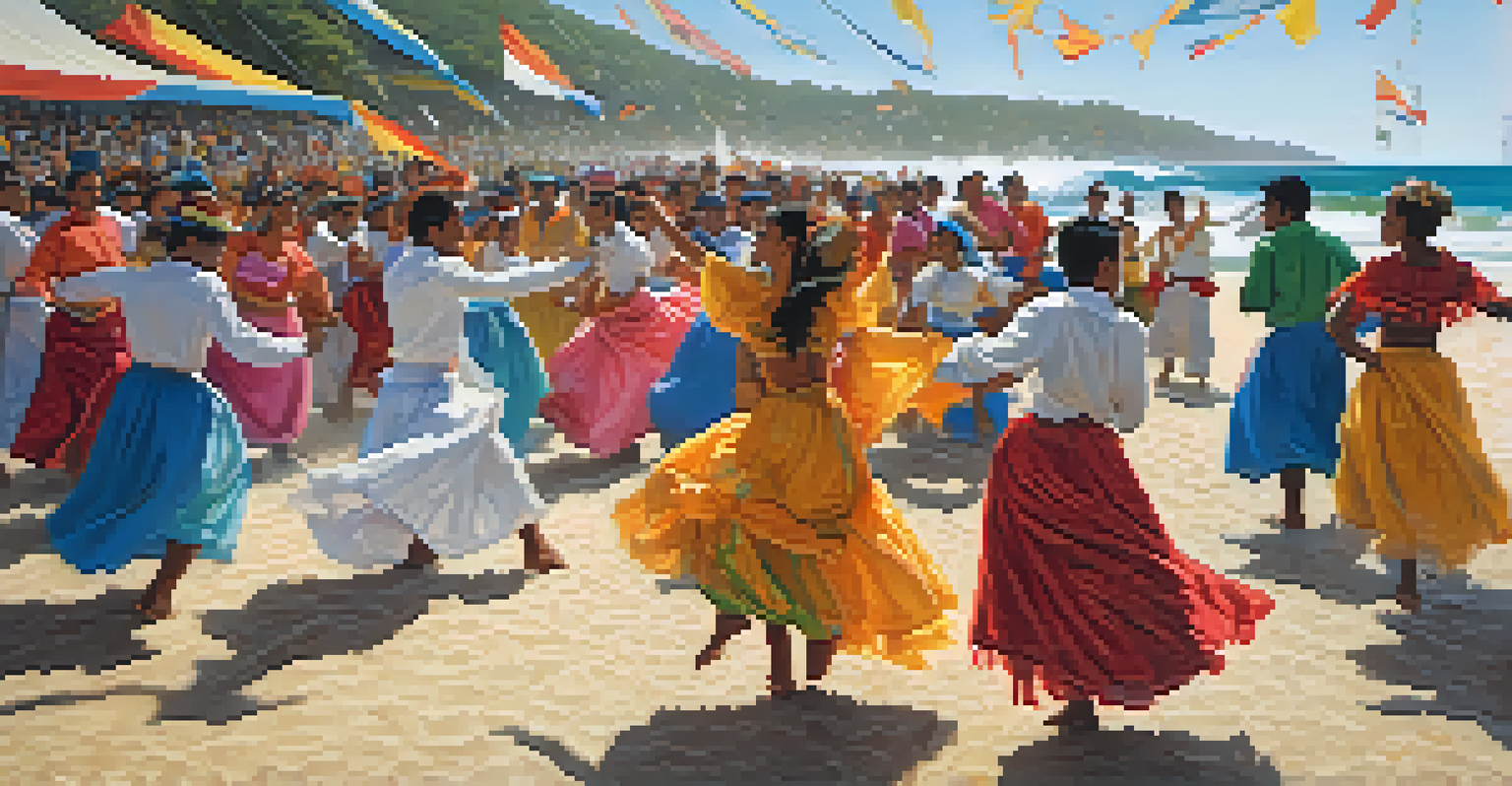Festa de Iemanjá: Celebrating the Queen of the Sea

Understanding Iemanjá: The Goddess of the Sea
Iemanjá is a revered deity in Afro-Brazilian culture, often referred to as the Queen of the Sea. She symbolizes motherhood, fertility, and the nurturing aspects of water. Many believe she protects fishermen and ensures bountiful catches, making her a vital figure in coastal communities.
The sea, once it casts its spell, holds one in its net of wonder forever.
Her roots trace back to the Yoruba religion in West Africa, where she is associated with rivers and the ocean. Over time, Iemanjá adapted to Brazilian culture, merging with local beliefs and customs. This integration highlights the rich tapestry of spiritual practices in Brazil, where various influences coexist harmoniously.
Celebrating Iemanjá allows people to connect with their heritage and pay homage to the sea's powerful forces. This connection is especially important for coastal communities that rely on the ocean for their livelihoods, making the festival both a spiritual and practical observance.
The Origins of Festa de Iemanjá
Festa de Iemanjá has roots reaching back to the early 20th century in Brazil. The celebration typically takes place on February 2nd, coinciding with the feast day of Iemanjá, attracting thousands of participants. This vibrant festival is particularly renowned in Salvador, Bahia, where it has become a major cultural event.

Originally, the festival was a modest offering to the goddess, with devotees presenting her with flowers, food, and gifts in hopes of receiving blessings. Over the years, it has evolved into a grand celebration filled with music, dance, and elaborate rituals. This evolution reflects the community's deepening reverence for Iemanjá and their desire to share this cultural heritage.
Iemanjá: Sea Goddess and Protector
Iemanjá is celebrated as the Queen of the Sea, symbolizing motherhood and nurturing, particularly in coastal communities reliant on the ocean.
As the festival grew, it attracted not only devotees but also tourists eager to witness the spectacular festivities. This blend of tradition and modernity makes Festa de Iemanjá a unique experience that celebrates both spiritual and cultural identity.
Rituals and Offerings During the Festival
A key aspect of Festa de Iemanjá is the ritual of offering gifts to the sea. Devotees prepare vibrant altars adorned with flowers, fruits, and symbols of the goddess. These offerings are often placed in small boats and released into the ocean, symbolizing a heartfelt plea for blessings and protection.
In every walk with nature one receives far more than he seeks.
The act of offering reflects deep respect and gratitude, as many believe that Iemanjá watches over their intentions. Participants often dress in white, a color associated with purity and peace, further emphasizing the spiritual significance of the celebration. This collective act fosters a sense of community and shared purpose among attendees.
As the boats drift away, the atmosphere is filled with music, singing, and dancing, creating an unforgettable experience. The combination of ritual and celebration showcases the vibrant culture surrounding Iemanjá and highlights the deep emotional connections people have with the goddess.
Cultural Significance of the Festival
Festa de Iemanjá is more than just a celebration; it is a vital expression of cultural identity for many Brazilians. It serves as a reminder of the historical ties between African traditions and Brazilian culture, fostering a sense of pride and belonging. The festival showcases the resilience of Afro-Brazilian communities and their commitment to preserving their heritage.
Through music, dance, and storytelling, participants pass down traditions and values to future generations. This cultural transmission is essential for maintaining the community's connection to its roots. The festival also encourages dialogue about cultural diversity and the importance of respecting different beliefs.
Festa de Iemanjá: Cultural Heritage
The Festa de Iemanjá is a vibrant festival that showcases the rich cultural identity of Afro-Brazilian communities through music, dance, and rituals.
Additionally, Festa de Iemanjá promotes unity among people from various backgrounds, as many join in the festivities regardless of their faith or ethnicity. This inclusivity is a testament to the festival's enduring appeal and its role in fostering understanding and solidarity.
Music and Dance: The Heartbeat of the Celebration
Music and dance are integral to the Festa de Iemanjá, infusing the celebration with energy and joy. Traditional rhythms, such as samba and axé, echo along the beachfront, captivating participants and encouraging them to dance. These lively beats create an atmosphere of festivity, drawing people together in a shared expression of joy.
In addition to traditional music, contemporary artists often perform, blending old and new sounds that resonate with a diverse audience. This fusion of musical styles reflects the dynamic nature of Brazilian culture and its ability to adapt and evolve over time. The performances not only entertain but also deepen the emotional connection to the festival.
Dance serves as a form of expression, allowing individuals to convey their feelings and connect with the spirit of Iemanjá. Whether it’s through spontaneous dancing or organized performances, movement plays a vital role in celebrating the goddess and honoring her presence in their lives.
Festa de Iemanjá: A Global Celebration
While Festa de Iemanjá is most famously celebrated in Brazil, similar festivities are observed in various parts of the world. In cities with significant Afro-Brazilian communities, such as New York and London, devotees gather to honor the goddess and participate in rituals that reflect their cultural heritage. These events help keep the spirit of Iemanjá alive beyond Brazilian borders.
The global celebration of Iemanjá highlights the universal themes of love, protection, and connection to nature. As people come together to express their devotion, they also celebrate the rich diversity of cultural practices across the globe. This shared experience fosters a sense of belonging among participants, regardless of their geographical location.
Global Celebration of Unity
While rooted in Brazil, the festival of Iemanjá is celebrated worldwide, highlighting universal themes of love and connection to nature among diverse communities.
Social media has played a pivotal role in connecting devotees worldwide, allowing them to share their experiences and traditions. This digital presence not only enhances the festival's visibility but also encourages a broader appreciation for Afro-Brazilian culture and the significance of Iemanjá in contemporary society.
Conclusion: Embracing the Spirit of Iemanjá
Festa de Iemanjá is a vibrant celebration that brings together communities to honor the goddess of the sea. Through rituals, music, and dance, participants express their devotion and celebrate their cultural identity. The festival serves as a reminder of the importance of preserving traditions and fostering unity among diverse backgrounds.
As we embrace the spirit of Iemanjá, we also recognize the power of nature and the deep connections it creates among people. The festival's enduring popularity reflects its significance in contemporary society and its ability to inspire future generations. Each year, as the offerings are cast into the waves, hopes and dreams are sent forth, strengthening the bond between humanity and the sea.

Ultimately, Festa de Iemanjá transcends geographical boundaries, uniting people in a shared celebration of love, gratitude, and reverence for the ocean. By participating in this festival, we honor not only the goddess but also the rich cultural heritage that continues to thrive in today's world.